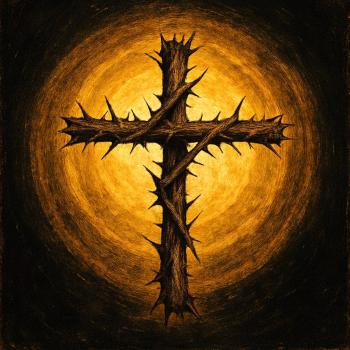The Adventurous Lectionary – Palm and Passion Sunday – March 24, 2024
Mark 11:1-11
Philippians 2:5-11
Mark 14:1-15:47 (or 15:1-47)
This year, it feels like we have been in Jerusalem during Holy Week. We hear the bombs falling in Gaza and feel the grief of Palestinians and Israelis for the atrocities sanctioned by both sides’ leadership, we struggle with the continuing Russian attacks on Ukraine sovereignty, we overhear presidential candidates speaking positively about Hitler and Putin and mesmerizing the majority of conservative Christians with their Messianic political claims and description of immigrants as vermin to be rounded up, and we are gobsmacked by the invectives aimed at immigrants and the opposition of those who are most hateful to enact any meaningful response to border security. I am sure that there would be calls to crucify Jesus if he showed up at certain congregations and political rallies, proclaiming the words of the Sermon on the Mount or Luke 4:18-19. We call ourselves a Christian nation but we are no different than those who praised Jesus on Palm Sunday and called for his execution in Pilate’s courtyard. And, we progressives are prone to sit on the sidelines, living with resignation, to quote Harry Emerson Fosdick, as we view the evils we deplore. We know what we aren’t and who we don’t want to be, but a positive path to national and global transformation often eludes us.
Still, in spite of our ambivalence and the ambiguity of our institutions, a living faith is an all-season faith. It embraces the highs and the lows, moments of elation and desolation, celebration and lament.
Under any circumstances, and even in relative calm, Palm Sunday is a challenging holy day in the life of the church. As entry point to Holy Week, it is the beginning of an emotional, spiritual, and political roller coaster. Despite the celebrative atmosphere of Palm Sunday, many congregations join palms and passion, hoping to counteract diminishing attendance at Holy Week services. It is believed that folks need to experience the Cross before the ecstatic celebration of Easter. Apart from experiencing Christ’s suffering, Easter lacks gravitas and promotes an unrealistic prosperity and success-oriented faith. I agree with this sentiment but recognize that celebrating Palm and Passion Sunday together may lead to an overly wordy, cerebral, and thus mind-numbing service. Going from celebration to resurrection is problematic and misses the reality of personal and global suffering. The Palm/Passion Sunday challenge is to portray celebration and desolation, joy and sorrow, and affirmation and betrayal in ways that touch the human spirit. To hold the contrasts of life in contrast and portray the tragic beauty that characterizes life in its ambiguous wonder.
Simplicity is essential in this service when it comes to scripture. Less is better than more, when it comes to scripture readings, so I prefer the shorter version of the Passion reading from Mark’s gospel. If children attend, we need to be child appropriate and share the Passion in ways they can understand.
Of course, as we enter this year’s Holy Week, we have had enough lamentation, as noted in the first paragraph. In a gloss on the Christmas ditty, “we need a little Easter right this very moment.” But, we need to be patient, and live with the incomplete and unanswered in all life’s changes. We need resurrection but first comes the Cross and conflict.
Palm Sunday begins with celebration, but the celebration is not whole-hearted or unambiguous like the revelries following the Super Bowl or World Series championships, New Year’s Eve, or the joy of a wedding, birthday, or positive life passage. There is laughter and elation and people are caught up in the affirmation of Jesus. He rides through town in majesty and some may believe that a new political era is on the way. The Messiah has come and soon the Romans will be sent packing. Still, the ambience is ambiguous. There is conflict at the fringes of the parade. Darkness is coming. Political and religious leaders are scheming. The possibility of legal action and condemnation is on the horizon. There is nothing new to this: goodness is still threatening to demagogues and the maligning of peacemakers is a constant among upholders of incivility and violence.
Palm Sunday is about Jesus and us. It portrays the fickleness of fame and popularity. Of hopes dashed by harsh reality. It presents to us our own spiritual fickleness and inability to commit ourselves fully to God’s way, especially in times of conflict. Palm Sunday excitement and success-oriented faith is replaced, even among the Hosanna singers, by cynicism, self-interest, and abandonment when the going gets tough. We hope that we aren’t the people who would desert Jesus or worse yet cry out for Barabbas’ freedom rather than Jesus’ exoneration. But as the tide turns, we might find a safe spot to observe, becoming as Thomas Merton says “guilty bystanders.”
The roller coaster of Holy Week begins with celebration and the expectation of a new age emerging. Hosanna carries the subtext, “throw the rascals out” and install a new political and religious order. That’s not Jesus’ mission. It may not be ours as well. While we might work for a transformed economic, immigration, environmental, and foreign policy, we must be both “in but not of” these conflicts. Politics without forgiveness and spirituality cannot save us. Jesus has strong beliefs and they will take him to the cross, but he refused to be entangled in political partisanship or polarization. God’s way must embrace celebrants and mourners, liberals and conservatives, quietists and activists, the oppressed and the oppressor. We don’t need to emulate media and political polarization and vilifying of opponents to promote God’s realm. We don’t need to create our idols of gold, celebrating fallible politicians as if they are divinely sent messengers. We are all standing in the need of prayer, critique, and transformation.
To me the central Palm/Passion Sunday passage is Philippians 2:5-11. This passage describes another kind of power and different type of victory, indeed another kind of God than is often paraded by today’s court preachers, conservative evangelicals, and televangelists. The Messiah, the Christ, wins by becoming one of us, taking on our fallibility and finitude, and transforms us from within on our plane. Christ does not “lord it over” us; Christ heals by inclusion and hospitality, by creating a realm in which there are no “others,” a realm in which even those we hate are wooed toward wholeness and salvation. In Christ’s victory, everyone bows down before him out of love, not fear of reprisal. Paul’s listeners would have been shocked by this redefinition of power, contrary to the ways of the world and to policies of Caesar. Paul affirms, to use Crossan’s imagery, a realm of “nuisances and nobodies,” but goes beyond to claim that even the powerful and contrary are welcomed into God’s realm.
There is no place for an authoritarian, unilateral, and coercive savior, nor is there any place for authoritarian, unilateral, and coercive congregations and politics.
Philippians 2:5-11 invites us to share in the mind of Christ and to look at our politics and decision-making in terms of relational rather coercive and unilateral power. Unilateral images of God lead to unilateral understandings of power, evident in the perorations of many of today’s court preachers’ denunciation of LGBTQ+ folk, immigrants, Muslims, Asians, and those who affirm the peaceful transition of presidential power. In exploring new images of relational power, we need to begin with our families, friendships, and congregational life. This process is slow and less decisive than practicing coercion and defeat. Yet, it maintains relationship, and leaves the door open for reconciliation and the honoring of diverse viewpoints.
While a purely “kenotic,” sacrificial and self-emptying approach, may not be appropriate in foreign policy or the policing of our streets, it inclines us to confront opposition and violence spiritually as well as coercively. Those who do wrong must be apprehended and their impact neutralized, but in the process they must still be seen as God’s beloved children. Our nation’s opponents must be confronted, but our own complicity in violence and injustice must be recognized and our foreign and economic policy transformed, so that we don’t succumb to demonization. Deep down there is something of God even in the vilest offenders and if we are to have hope for the future, we must be willing to look beyond the exterior and work toward reconciliation. Still leaders must be motivated by reconciliation, healing, and cooperation. Demonization of opponents or strangers is off limits for followers of Jesus. We can protest and boycott – and often should – and also pray for those we believe are perpetrating evil in our time.
Palm Sunday invites us to experience the full roller coaster of life – and discover the interplay of joy and sorrow which awakens us to the divine possibility of healing and reconciliation in the chaos of our own ambiguous lives. (For more on a relational vision of God, see Bruce Epperly, “Process Theology: Embracing Adventure with God” and “Process Theology: A Guide for the Perplexed,” and Thomas Jay Oord, “The Uncontrolling Love of God: An Open and Relational Account of Providence” and “God Can’t.”)
+++
Rev. Bruce Epperly Ph.D. has served as a professor, seminary administrator, university chaplain, and congregational pastor at Georgetown University, Wesley Theological Seminary, Lancaster Theological Seminary, and South Congregational Church United Church of Christ on Cape Cod. “Retired,” he continues to teach in the Doctoral of Ministry program at Wesley Theological Seminary, give seminars, write, and rejoice in grandparenting and marriage with Rev. Dr. Kate Epperly. An ordained minister in the United Church of Christ and Christian Church (Disciples of Christ), he is the author of over eighty books, “The Elephant is Running: Process and Open and Relational Theology and Religious Pluralism,” “Jesus: Mystic, Healer, and Prophet,” “Walking with Francis of Assisi: From Privilege to Activism,” “Simplicity, Spirituality, and Service: The Eternal Wisdom of Francis, Clare, and Bonaventure,” and “Taking a Walk with Whitehead: Meditations with Process-Relational Theology.” His books on faith and politics include, “Talking Politics with Jesus: A Process Perspective on the Sermon on the Mount,” “One World: The Lord’s Prayer from a Process Perspective,” and “Process Theology and Politics. His most recent texts are a trilogy: “Process Theology and Healing,” “Process Theology and Mysticism,” and “Process Theology and Prophetic Faith.” He may be reached at [email protected].












